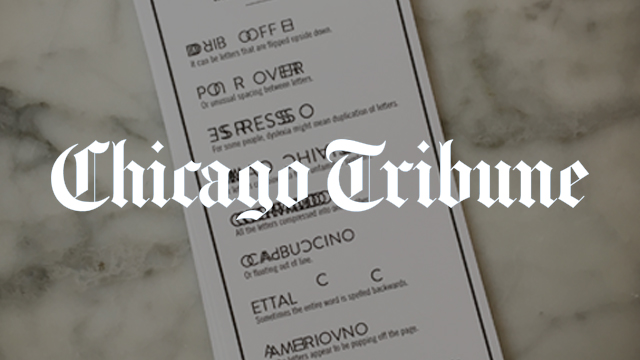Chia ettal? Uptown coffee shop transforms into ‘Dyslexia Cafe’.
Chicago Tribune — July 28, 2017
By Christen A. Johnson
What do tourists effortlessly navigating the Chicago train map and ordering off a menu have in common? They both require reading comprehension skills. But, for the 10 to 15 percent of Americans who have dyslexia, these mundane tasks can be daunting.
To bring awareness to patrons about the disability, Uptown’s Heritage Outpost Coffee Shop transformed into an immersive experience called “Dyslexia Cafe.”
“Our goal was to put people in the shoes of someone with dyslexia,” said Lizzy Ploumidis, an intern at Cramer-Krasselt advertising agency who worked on the project. “Who thinks twice about ordering coffee when you can read the menu? That’s not the case for everyone. We wanted to show that frustration.”
Menus (which described the different ways dyslexia can manifest itself), front window clings and bathroom signs all featured letters that were compressed, jumping off the page, duplicated, backward or mixed up to make a different word.
“Dyslexia is different for everyone who experiences it; it’s not a one-size-fits-all. We wanted to give a broad range of those examples,” said intern Andrea Ares, who also worked on the project.
“A lot of the things truly re-create the frustration that accompanies dyslexia,” said Dr. Danielle Baran, incoming president of Everyone Reading Illinois (ERI), a nonprofit advocacy organization for kids with dyslexia and a partner of the “Dyslexia Cafe,” about the hard-to-read visuals.
Customer Sorah Kim said she didn’t know what was happening after noticing the signs and menu.
“I texted my husband and joked, ‘Is this the new hipster way of writing things?’ But before reading the menu facts on dyslexia, she said she didn’t know the disability presented itself in so many ways. “It educated me in terms of what dyslexics see when they look at words, letters and numbers,” she said.
“Dyslexia Cafe” came about as part of the interns’ summer program with Cramer-Krasselt. They were charged with finding surprising, compelling topics that would challenge a common perception or action.
“We pushed the interns to do social things,” said Josh Mizrachi, creator of the intern program and a creative director at Cramer-Krasselt. “We explored a lot of different avenues but immediately saw the impact this one could have.”
After much research, the interns developed a passion to debunk false beliefs about dyslexia.
“We found staggering facts and were super interested by them and how they affect people in everyday life,” said Ploumidis. “There are huge misperceptions about dyslexia, so we wanted to make people aware that it’s more than backward words, it’s actually very common.”
After getting the idea approved, the next step was finding allies who believed in the project too.
“We wanted a partner with a tie to learning disabilities and dyslexia,” explained Ploumidis. “We were happy to join with ERI, who provided reading simulations for more interaction. Heritage Outpost was also awesome in letting us change up their space for the day.”
When the idea was pitched to Heritage Outpost general manager, Derek Lewis, he said it was a no-brainer.
“We were super excited to be a part. The biggest things the interns were looking for,” he said, “were reactions to the change, and they got that. People have been coming in disoriented or giving second looks. I think everyone who’s come through has taken something new away. That was the point.”
More News
- June 23, 2017 The C-K June 2017 playlist.
- June 13, 2017 Former C-K Create intern wins Collegiate Effie Award.
- June 6, 2017 Takeaways from Google Marketing Next 2017.
